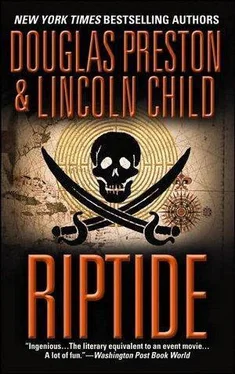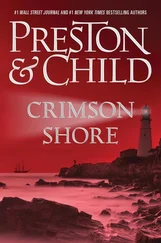Douglas Preston - Riptide
Здесь есть возможность читать онлайн «Douglas Preston - Riptide» весь текст электронной книги совершенно бесплатно (целиком полную версию без сокращений). В некоторых случаях можно слушать аудио, скачать через торрент в формате fb2 и присутствует краткое содержание. Жанр: Триллер, на английском языке. Описание произведения, (предисловие) а так же отзывы посетителей доступны на портале библиотеки ЛибКат.
- Название:Riptide
- Автор:
- Жанр:
- Год:неизвестен
- ISBN:нет данных
- Рейтинг книги:3 / 5. Голосов: 1
-
Избранное:Добавить в избранное
- Отзывы:
-
Ваша оценка:
- 60
- 1
- 2
- 3
- 4
- 5
Riptide: краткое содержание, описание и аннотация
Предлагаем к чтению аннотацию, описание, краткое содержание или предисловие (зависит от того, что написал сам автор книги «Riptide»). Если вы не нашли необходимую информацию о книге — напишите в комментариях, мы постараемся отыскать её.
Riptide — читать онлайн бесплатно полную книгу (весь текст) целиком
Ниже представлен текст книги, разбитый по страницам. Система сохранения места последней прочитанной страницы, позволяет с удобством читать онлайн бесплатно книгу «Riptide», без необходимости каждый раз заново искать на чём Вы остановились. Поставьте закладку, и сможете в любой момент перейти на страницу, на которой закончили чтение.
Интервал:
Закладка:
"Makes sense," Hatch had replied. "Why keep unnecessary staff around? Besides, I'd rather treat a bad case of necrifying madura foot than sit in a cabin like this, staring at a jumble of letters."
Hatch remembered how Wopner's lip had curled in scorn. "Shows how much you know. A jumble of letters to you, maybe.
Listen: On the other side of that jumble is the person who encrypted it, looking back, giving you the finger. It's the ultimate contest. You get his algorithm, you get his crown jewels. Maybe it's access to a credit card database. Or the firing sequences for a nuclear attack. Or the key to how a treasure is buried. There's no rush like cracking a code. Cryptanalysis is the only game worthy of a truly intelligent being. Which makes me feel mighty lonely in present company, believe you me."
Hatch sighed, returning his attention to the black folders. The second contained the brief biography of Ockham, given him by St. John. Leaning back once again to let the moonlight catch the pages, he began to read.
Chapter 13
EXTRACT FOLLOWS
Document Number: T14-A-41298
Spool: 14049
Logical Unit: LU-48
Research associate: T. T. Ferrell
Extract requested by: C. St. John
COPY 001 OF 003
This document is copyright by and trade secret to
Thalassa Holdings, Inc.
Unauthorized use is a tortious offense and a violation
of the Virginia Penal Code.
DO NOT DUPLICATE
EDWARD OCKHAM SUMMARY BIOGRAPHY
T. T. Ferrell, Thalassa—Shreveport
Edward Ockham was born in 1662 in Cornwall, En- gland, the son of minor landed nobility. He was educated at Harrow and went on to spend two years at Balliol College, Oxford, before being sent down by the college dons for unspecified infractions.
His family desired him to pursue a naval career, and in 1682 Ockham received his commission and shipped as a lieutenant with the Mediterranean fleet under Admiral Poynton. Rising quickly and distinguishing himself in several actions against the Spanish, he left the navy to become captain of a privateer, having been granted a letter of marque from the British Admiralty.
After a number of choice prizes, Ockham apparently decided that he no longer wished to share his spoils with the crown. Early in 1685 he took up slaving, running ships from Africa's Guinea Coast to Guadeloupe in the Windward Islands. After almost two years of profitable voyages, Ockham was trapped within a blockaded harbor by two ships of the line. As a diversion, Ockham set his ship afire and got away in a small cutter. Before escaping, however, he put all the slaves on deck to the sword. The rest of the four hundred slaves, shackled together in the hold, perished in the blaze. Documentary evidence attributes the nickname of "Red Ned" Ockham to this deed.
Five of Ockham's crew were captured and returned to London, where they were hung at Execution Dock in Wapping. Ockham, however, escaped to the infamous pirate haven of Port Royal in the Caribbean, where he joined the "Brethren of the Coast" in 1687. [Cf. Thalassa document P6-B19-110292, Pirate Treasures of Port Royal (Reputed)]
Over the next ten years, Ockham became known as the most ruthless, venal, and ambitious pirate operating in the waters off the New World. Many notorious pirate techniques—such as walking the plank, use of the skull and crossbones to strike fear into the hearts of adversaries, and rescate (ransoming of civilian prisoners)—can be traced to his innovations. When attacking towns or ships, he was quick to use torture on any and all in order to ascertain where plunder might be hidden. Imposing both physically and intellectually, Ockham was one of the few pirate captains to demand—and be granted—a much larger share of the spoils than his crew.
During his reign as pirate captain, Ockham won his victories with a rare blend of psychology, tactics, and ruthlessness. When attacking the heavily fortified Spanish city of Portobello, for example, he forced the nuns from a nearby abbey to place the siege engines and ladders themselves, reasoning that the strong Catholicism of the Spaniards would constrain them from firing. His weapon of choice became the musketoon, a short-barreled weapon that fired a lethal spray of lead pellets. Frequently, under pretense of a parley, he would gather the town fathers of a besieged city or the commanding officers of an opposing ship before him. Then—raising the weapons in both hands—he would destroy the group with a double blast.
As his thirst for prizes grew stronger, Ockham's brazenness grew proportionately. In 1691 he tried an overland siege of Panama City, which ultimately failed. While retreating across the Chagres River, he saw a galleon in the nearby bay, heading for the open sea and Spain. When he learned that the ship was carrying three million pieces of eight, Ockham reputedly swore never to let another galleon escape his grasp.
In the years that followed, Ockham turned his attention ever more strongly toward Spanish gold, the towns that hoarded it, and the ships that carried it. So adept did he become at anticipating the shipments of gold that some scholars believe he was able to crack the ciphers of Spanish captains and envoys [Cf. Thalassa restricted document Z-A4-050997]. In a single month's plundering spree of Spanish settlements in the fall of 1693, each of Ockham's eight hundred crew received six hundred pieces of eight as their share of the booty.
As Ockham became more powerful and more feared, his sadistic tendencies seemed to gain ascendancy. Reports of barbarous cruelty became legion. Frequently, after overwhelming a ship, he would cut off the ears of the officers, sprinkle them with salt and vinegar, and force the victims to consume them. Rather than keep his men in check when despoiling a town, he would instead whip them into a lustful fury and then let them loose upon the helpless populace, reveling in the acts of violence and abandon that resulted. When victims could not provide him with the ransom he demanded, he would order them to be roasted slowly on wooden spits, or disemboweled with heated boathooks.
Ockham's single greatest accomplishment came in 1695, when his small armada of ships successfully captured, plundered, and sank the Spanish flota de plata bound for Cadiz. The sheer volume of treasure he acquired—in gold bars and cakes, silver wedges and pigs, undrilled pearls, and jewels—has been estimated at over a billion dollars in face value alone.
Ockham's eventual fate remains a mystery. In 1697, his command ship was found off the Azores, drifting free, all hands dead of an unknown affliction. No treasure was found on board, and scholars of the period agree he had concealed it along the east coast of the New World sometime shortly before his death. Although many legends of varying credibility have arisen, the strongest evidence points to one of three potential sites: Ile a Vache off Hispaniola; South Carolina's Isle of Palms; or Ragged Island, off the Maine Coast, seventy miles north of Monhegan.
PRINTOUT ENDS SPOOL TIME: 001:02 TOTAL BYTES: 15425
Chapter 14
Hatch throttled down the diesels of the Plain Jane, then dropped anchor twenty yards off the lee shore of Ragged Island. It was 6:30, and the sun had just topped the sea horizon, throwing a gauzy gold light across the island. For the first time since Hatch had returned to Stormhaven, the island's protective mist had lifted completely. He clambered into the dinghy and motored toward the navy-issue prefabricated pier at Base Camp. Already the day was warm and humid, and there was a certain heaviness in the air that presaged bad weather.
As he gazed across the scene, his old apprehensions began to ease. Over the last forty-eight hours, Ragged Island had grown comfortingly unrecognizable. An enormous amount of work had been accomplished, more than he could have believed possible. Yellow "crime scene" tape had been strung around the unstable areas of the island, with safe corridors delineated for walking. The meadows above the narrow strip of shingle beach had been transformed from a place of deserted silence to a miniature city. Trailers and Quonset huts were arranged in a tight circle. Beyond, a brace of massive generators thrummed, wafting diesel fumes into the air. Beside them sat two enormous fuel tanks. Bundles of white PVC pipe flowed across the muddy ground, shielding date lines and power cords from the elements and unwary feet. In the midst of the chaos stood Island One, the command center, a double-wide trailer festooned with communications gear and transmitters.
Читать дальшеИнтервал:
Закладка:
Похожие книги на «Riptide»
Представляем Вашему вниманию похожие книги на «Riptide» списком для выбора. Мы отобрали схожую по названию и смыслу литературу в надежде предоставить читателям больше вариантов отыскать новые, интересные, ещё непрочитанные произведения.
Обсуждение, отзывы о книге «Riptide» и просто собственные мнения читателей. Оставьте ваши комментарии, напишите, что Вы думаете о произведении, его смысле или главных героях. Укажите что конкретно понравилось, а что нет, и почему Вы так считаете.












